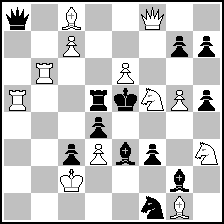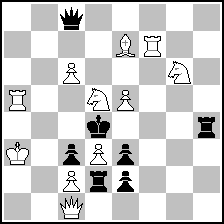|
|
| (1) Posted by Eugene Rosner [Monday, Oct 17, 2011 16:05] |
Looking for a Byron Zappas #2....
can anyone supply a diagram? It is a threat reduction problem where try? (2.ABC), try (2.AB) solution (2.A) with B,C returning as variations. I'm currently focusing on this theme, but I lost this example...thanks in advance!
Eugene
|
|
| (2) Posted by Dan Meinking [Monday, Oct 17, 2011 18:15] |
There are 143 Zappas two-movers listed on YACPDB (Yet Another Chess Problem Database):
http://www.yacpdb.org/#SearchHelp
You can click on each problem to see the underlying analysis.
|
|
| (3) Posted by Michael McDowell [Monday, Oct 17, 2011 18:15] |
This looks like the problem:
B.Zappas
4th HM The Problemist 1987
 (= 12+12 ) (= 12+12 )
Mate in 2
1.Sh4 (>2.Qxg7, Qf5, Qd6) 1...Qc6!
1.Se7? (>2.Qxg7, Qf5) 1...Bxh3!
1.Sxd4 (>2.Qxg7)
1...Bxg5 2.Qf5
1...Rxa5 2.Qd6
1...Qc6 2.Sxc6
1...Bxh3 2.Sxf3
1...Kxd4 2.Qf4
|
|
| (4) Posted by Eugene Rosner [Monday, Oct 17, 2011 18:43] |
many thanks Michael!
|
|
| (5) Posted by Jacques Rotenberg [Tuesday, Oct 18, 2011 06:22] |
There are a few other problems with this idea
|
|
| (6) Posted by Eugene Rosner [Tuesday, Oct 18, 2011 18:23] |
Jacques-
any particularly interesting examples? has a 4-threat reduced to 1 ever shown BCD returning as variations after the key?
|
|
| (7) Posted by Hauke Reddmann [Wednesday, Oct 19, 2011 12:21] |
In case nobody else turns up with that, I suggest
to ask Udo Degener. What you describe might already
be searchable by keyword in his collection.
Hauke
|
|
| (8) Posted by Harry Fougiaxis [Wednesday, Oct 19, 2011 23:02]; edited by Harry Fougiaxis [11-10-19] |
Successive elimination of threats is recognized by WinChloe, so I made a quick search. Two interesting problems that I've found:
Anatoly Slesarenko
V. Rychkov-50 MT 2005-06
Special Prize
 (= 11+7 ) (= 11+7 )
‡2
1…R×c2 2.Q×e3‡
1.Sf6? [2.Bc5,Rd5,Ra4‡]
but 1…Q×c6!
1.Sb4? [2.Bc5,Rd5‡]
1…Q×c6 2.S×c6‡
but 1…R×d3!
1.S×e3! [2.Bc5‡]
1…Q×c6,Qf8 2.Sf5‡
1…R×c2 2.Rd5‡
1…R×d3 2.Ra4‡
1…K×e3 2.Qg1‡
This expands the mechanism of Byron's problem by adding two changed mates and dual avoidance in the solution.
The wRf7 is used for guarding f3 and keeping closed the line f8-f5.
The second problem shows a fourfold task. Truly impressive and, of course, it found its way to the album.
Vasil Markovtsy
Shakhova kompozitsya Ukraini 2001
 (= 10+11 ) (= 10+11 )
‡2
1.Bf8? [2.Qe6,Qd6,Qc4,Qb5‡]
but 1…Be7!
1.Bb8? [2.Qd6,Qc4,Qb5‡]
but 1…Bc7!
1.f8=Q? [2.Qc4,Qb5‡]
1…Be7 2.Q×a8‡
but 1…Rc3!
1.Be5? [2.Qd6,Qc4‡]
1…f×e5 2.R×e5‡
but 1…Rd4!
1.Bf4! [2.Qc4‡]
1…Rc3 2.Qd6‡
1…Rd4 2.Qb5‡
1…K×e4 2.Qe6‡
Vasil Dyachuk seems to have been quite interested in the theme, too.
|
|
| (9) Posted by Eugene Rosner [Thursday, Oct 20, 2011 03:34] |
MANY thanks Harry! GREAT examples, the 2nd exaxtly what I was looking for!!
|
|
| (10) Posted by Jacques Rotenberg [Friday, Oct 21, 2011 10:23] |
I thought you wanted the mates to reappear also in all the tries....
|
|
| (11) Posted by Harry Fougiaxis [Saturday, Oct 22, 2011 01:52] |
Eugene, I think you may also like the dynamic play in the following example:
Ivan Storozhenko
Uralsky Problemist 2004
1 Prize
 (= 8+12 ) (= 8+12 )
‡2
1.Rbe6? [2.R4e5,Qc5,Sf6‡]
but 1…R×e4!
1.Rf6? [2.Re5,Qc5‡]
but 1…Sc6!
1.Rg6! [2.Re5‡]
1…R×e4 2.Qc5‡
1…Sc6 2.Sf6‡
1…S×a7,Sd6 2.R(×)d6‡
1…K×e4 2.Rg5‡
|
|
| (12) Posted by Eugene Rosner [Sunday, Oct 23, 2011 05:20] |
Harry-
this last one you quote sports the Bogdanov-Rychkov theme (as explained to me by Anatoly Slesarenko)in which refutations of tries lead to returned threats as variations in the solution. How many Album points did the Markovitsky get?!
|
|
| (13) Posted by Jacques Rotenberg [Monday, Oct 24, 2011 02:36]; edited by Jacques Rotenberg [11-10-24] |
Mark Basisty & Anatoly Vasilenko
Memorial Rychkov 50, 2005-2006
1st H.M.
 (= 10+8 ) (= 10+8 )
2#
1.Bf2? [2.Sd4,Se3,Qc5‡]
but 1…Bb6!
1.Be3? [2.Sd4,Qc5‡]
1…Q×e3 2.S×e3‡
1…Bb6 2.Rg5‡
but 1…Bf6!
1.Bd4! [2.Qc5‡]
1…Q×d4 2.S×d4‡
1…Qe3 2.S×e3‡
1…Bf6,Bb6 2.R(×)f6‡
1.Qb8? [2.Qb1‡]
1…Bb6 2.Qf8‡
but 1…Q×c5!
|
|
| (14) Posted by Eugene Rosner [Monday, Oct 24, 2011 20:35] |
Jacques-
simple, elegant and ingenious all at the same time! thanks for quoting!
|
|
| (15) Posted by Harry Fougiaxis [Tuesday, Oct 25, 2011 00:11] |
Jacques, the Markovtsy's composition got 8 points.
The thematic description in the album mentions: threat reduction 4-3-2-1, 3 x recurrence of threat, Hannelius with double threat.
|
|
| (16) Posted by Jacques Rotenberg [Wednesday, Oct 26, 2011 07:18]; edited by Jacques Rotenberg [11-10-26] |
All these problems have a weakness in the multiple threat tries : the lack of black moves that would "separate" the threats.
A threat that never appears alone can be called "useless threat". Two threats that appear always together can be called "dualistic threat".
It seems that showing the successive elimination of multiple threats with threat mates reappearing in the solution without any "useless threat" represents a serious challenge
|
|
No more posts |
MatPlus.Net  Forum Forum  General General  Looking for a Byron Zappas #2.... Looking for a Byron Zappas #2.... |
 ISC 2024
ISC 2024 Forum
Forum  General
General  Looking for a Byron Zappas #2....
Looking for a Byron Zappas #2.... 


